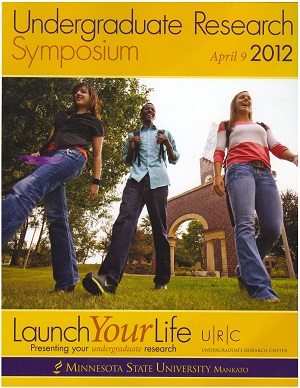Raising Relatives Children: The Relationships, Stressors and Methods of Coping
Location
CSU Ballroom
Start Date
9-4-2012 1:00 PM
End Date
9-4-2012 2:30 PM
Student's Major
Family Consumer Science
Student's College
Allied Health and Nursing
Mentor's Name
Heather Von Bank
Mentor's Department
Family Consumer Science
Mentor's College
Allied Health and Nursing
Description
In today’s society, it has become common for individuals to assume the primary caregiving of their family member’s children. But to commit to raising a relatives’ child can cause great stress and leave one feeling overwhelmed and unprepared to meet new and unexpected financial and emotional challenges. This qualitative study investigated the stresses and coping mechanisms that individuals used to handle these difficult situations. Data was collected through semi-structured focus group interviews with participants who attended a “Raising Relative’s Children” support group at locations across the Minneapolis and Southern Minnesota region. Participants’ responded to questions about the relationship they have with the child, their relationship with the parents of the child, and their coping skills. Our findings show that while the respondents expressed great levels of stress and frustration, they also focused on the positive outcomes that resulted in their decision to raise the children. Caregivers voiced their experience of raising their grandchildren, nieces or nephews, or great-grandchildren, by countering every “negative with a positive” in describing their relationship with the children. Often the participants’ relationship with their own children was strained and left them feeling confused, disappointed and angry. To cope with stressors, the caregivers turned to the support group, religion, and family members. This study merely scratches the surface and reveals the experiences of a growing section of the older-adult population. It also highlights a need for more support for individuals who decide to raise their relatives’ children.
Raising Relatives Children: The Relationships, Stressors and Methods of Coping
CSU Ballroom
In today’s society, it has become common for individuals to assume the primary caregiving of their family member’s children. But to commit to raising a relatives’ child can cause great stress and leave one feeling overwhelmed and unprepared to meet new and unexpected financial and emotional challenges. This qualitative study investigated the stresses and coping mechanisms that individuals used to handle these difficult situations. Data was collected through semi-structured focus group interviews with participants who attended a “Raising Relative’s Children” support group at locations across the Minneapolis and Southern Minnesota region. Participants’ responded to questions about the relationship they have with the child, their relationship with the parents of the child, and their coping skills. Our findings show that while the respondents expressed great levels of stress and frustration, they also focused on the positive outcomes that resulted in their decision to raise the children. Caregivers voiced their experience of raising their grandchildren, nieces or nephews, or great-grandchildren, by countering every “negative with a positive” in describing their relationship with the children. Often the participants’ relationship with their own children was strained and left them feeling confused, disappointed and angry. To cope with stressors, the caregivers turned to the support group, religion, and family members. This study merely scratches the surface and reveals the experiences of a growing section of the older-adult population. It also highlights a need for more support for individuals who decide to raise their relatives’ children.
Recommended Citation
Jones, Danielle. "Raising Relatives Children: The Relationships, Stressors and Methods of Coping." Undergraduate Research Symposium, Mankato, MN, April 9, 2012.
https://cornerstone.lib.mnsu.edu/urs/2012/poster-session-B/9




